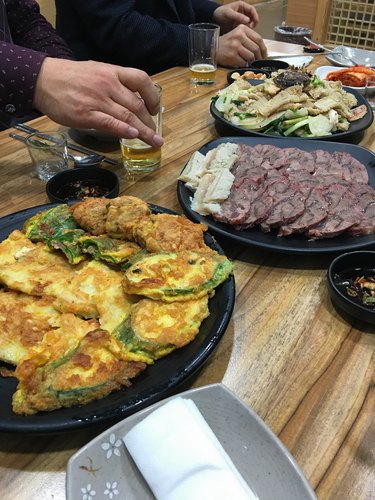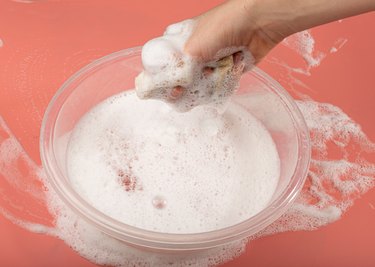
A new home is something to celebrate. In South Korea, while newlyweds are putting new twists on the old traditions, many guests still give the odd-ball customary gifts that are both practical and full of significance.
Most housewarming parties in Korea today are thrown by newlyweds setting up their first home together. So, they can feel similar to a wedding shower, but planned by the couple, not friends, and usually after, not before, the wedding.
Video of the Day
Video of the Day
And, while bridal showers can take place at the office in the U.S. so that the co-workers can bestow gifts on newlyweds, in Korea, housewarming parties take place at the home and the new homeowners do more of the giving than their co-workers. The guests are treated with a big meal and drinks in exchange for toilet paper and dishwashing detergent!
Korean housewarming parties
According to historical texts, 집들이, "jipdeuri", was a ceremony held on the evening of the move into a new home to ask the gods for both protection and blessings. Prayers were offered to invite good spirits, ward off evil ones, prevent fire or flood and request that everything go smoothly. Part of the ritual included placing a glass of wine, a bowl of clean water, and a willow branch or green leaf on an altar.
While such ceremonies are rarely performed today, there is another tradition that is so embedded in Korean culture it remains a big part of housewarming parties: "한턱". In Korea, when something good happens to you, you are expected to celebrate by treating others to food and drink. Got promoted? Your coworkers will congratulate you by saying, "You'll have to treat us all to drinks tonight!" And, so to celebrate the good fortune of a new home, the new homeowners are, in some ways, the big givers.

Depending on the couple's circumstances, the housewarming can be an opportunity to showcase married life not only with friends and family, but also with coworkers who may not usually have the chance to enter their home. More affluent couples who typically received their new homes as gifts from their parents might welcome the occasion as a socially acceptable way to show off.
For others, such parties can feel burdensome. Even though many women have jobs outside of the home, they are often still responsible for cooking and hosting duties. So, it isn't surprising that some women balk at the thought of cleaning up after inebriated co-workers who overstay their welcome into the wee hours of the morning.
Moreover, many apartments in Seoul are quite small and not conducive to large parties.
A number of couples, therefore, will opt to host housewarming dinners at a nearby restaurant and then invite guests back for coffee and dessert. Others will host, but order in pizza or fried chicken—popular options that are easy to serve and pair with drinks.
Korean housewarming gift ideas
Most guests will bring traditional gifts for the new house not only because the gifts are practical but also because they signify wishes of good luck and prosperity. Many of these entail simple household items that everyone needs.

Dishwashing soap, laundry detergent or other cleaning supplies are common housewarming gifts in Korea. Not only do they symbolize wishes for a physically and spiritually pure home, but, for soap or detergent, the round, shiny, sudsy bubbles represent the growth or multiplying of coins and, hence, prosperity.

Everyone needs rolls of toilet paper. Since you never want to run out, it makes a great gift. In Korea, a toilet paper gift encompasses additional meanings and a play on words. Because it can unroll long and smoothly, a gift set of toilet paper is a wish for endeavors to have lasting smooth roll-outs. The bathroom item also hints at good metabolism. which in Korean can also be used to refer to things resolving well.
In traditional housewarming ceremonies, guests brought matches and candles as gifts to new homeowners. Others made handmade noodles to signify long life or good health.
Today, other gifts might include decorative items for the home, a bottle of wine, food items or gift certificates.
Mixing old and new, Korean housewarming gifts and parties are all about celebrating good fortune. New homeowners share their good fortune with their guests. And, guests give meaningful and practical gifts as a wish for even more blessings in the new home.